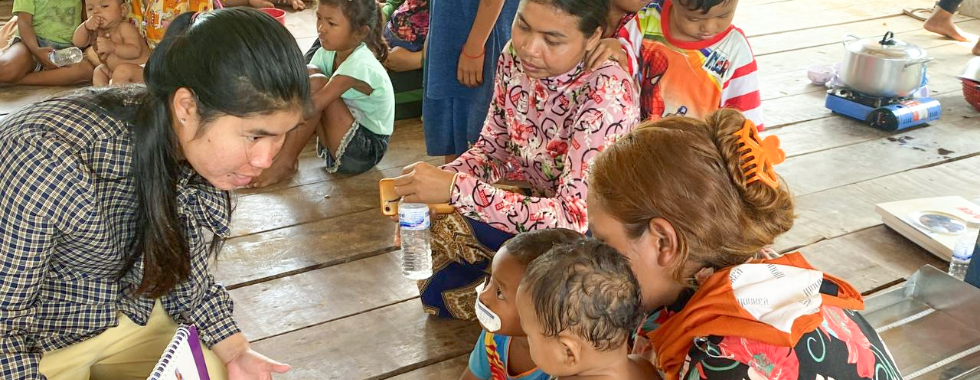《SHARE’s sincere opinion》
シェアが主張すること

Now that our new Immigration Control and Refugee Recognition Act is scheduled to come into force, we think our non-Japanese residents’ Social Right to Health is in imminent danger.
Do you happen to know the WHO’s definition of Health?
1948’s WHO Health definition is as follows;
“Health is a state of complete physical, mental and social well-being and not merely the absence of disease or infirmity.”
The enjoyment of the highest attainable standard of health is one of the fundamental rights of every human being without distinction of race, religion, political belief, economic or social condition.”
As you could clearly understand from the above manifesto, each and every person’s health security has now become the common goal of humanity.
In line with the tenets of the WHO, SHARE has been supporting the health of non-Japanese residents for over 30 years.
We are endeavoring to support non-Japanese citizens who live peacefully with us as our neighbors without any discrimination and to duly protect their lives, human rights and dignity.
However, we feel now more than ever that our fellow non-Japanese citizens’ “Social Right to Health” is severely threatened.
The revised immigration legislation was approved during the Ministerial Cabinet meeting on March 15, 2024 which stipulates that any failure to fulfill obligations under the Immigration Control Act is a reason for cancellation of residential status is enormously concerning to us. For example, in case someone does not carry their residential card with them, or if they forget to renew their expired card, they can be punished with cancellation of their residential status.
An elderly person who has lived honestly and humbly in Japan for over 40 years exclaimed after learning the content of the revised immigration law, “What in the world are they doing? It’s outrageous and sad! Why?”. If this bill actually becomes law, his living base and the life he has earnestly created for himself will be in tatters. His social networks and common bonds and history with his friends will also be completely uprooted and taken away. How horrifying for him to suffer such damages!
Among the ‘Permanent Residents’ of non-Japanese many are elderly persons. If they develop dementia, it will be almost impossible for them to always carry their residential cards each time they go out, to verify the card’s expiration dates, and go to their city or town office for renewal. They may even forget where they stowed the card away. They will lose track the meaning of the card itself. They often live in solitary and isolated conditions with no available supporters. With advanced age, they will lose physical independence. Some of them cannot speak, read or write in Japanese. Is our government entitled to deprive of their ‘residential status’ because of such petty reasons? Which foreign country will the Immigration Office banish such persons to?
The new Immigration Law is against human decency and against the morality. What has happened to our country?
Under the current immigration law, there are penalties for failure to notify about the change of residence. All mid- and long-term non-Japanese residents are required to register their whereabouts to their city/town/village office within 14 days after they newly settle down. If someone simply delay in reporting, they will be fined up to 200 thousand-yen.
On July 9, 2012 partial revision of Basic Resident Registration Act came into force. Accordingly, non-Japanese residents also have to comply with this new legislation. However, in a situation where Japanese residents happen to delay in reporting, they only have to pay a non-penal fine of up to 50 thousand-yen. If a non-Japanese resident fails to report, they will be required to pay a penal fine and it will be recorded as prior conviction. Non-penal fines are a slight monetary punishment and do not constitute a criminal offense. It is a huge difference whether one is treated as a criminal or not, considering that Japanese and non-Japanese people may live in the same community and have committed the same mistake. It seems that either non-Japanese residents or their Japanese civil rights supporters do not take note of this unfair treatment vis-a-vis non-Japanese.
The revision of the Immigration Law this time around will possibly add deprivation of permanent residential status, of right to live and of social right to criminal record.
For non-Japanese residents this is a real horror story. Is there any country in the whole world other than Japan that can deprive people with foreign status of their permanent residency, make them lose their residential status and kick them out of the country because of such petty reasons?
We are afraid that this new legislation will be absolutely and unavoidably be to the detriment of Japanese people.
Once it becomes the law, we will lose the status of so-called ‘advanced democracy’. We will lose confidence of the outside world because of this double standard in human-rights. It is very sad and regrettable for us Japanese as well.
In the Global 7 Summit which was held in Hiroshima last year, the leaders declared in one voice that they will firmly respect and protect the human-rights of all people including immigrants.
G7 Hiroshima Leaders’ Communiqué May 20, 2023
<Human-Rights, Refugees, Migration, Democracy>
- 45. We reaffirm our commitment to upholding human rights and dignity of all, as set out in the Universal Declaration of Human Rights, so that everyone can participate fully and equally in society. We commit to firmly speaking out against human rights violations and abuses, and at the same time, listening to and assisting the countries and civil society organizations that seek to defend and promote human rights through dialogue and cooperation.
We reaffirm our commitment to protecting refugees, supporting forcibly displaced persons and supporting host countries and communities, ensuring the full respect for human rights and fundamental freedoms of refugees and displaced persons, and defending and promoting the rights of marginalized people or persons facing vulnerable conditions exacerbated by conflict, crisis, and displacement, including freedom from sexual and gender-based violence.
- 46. We reaffirm our commitment to ensuring the safe, orderly, and regular migration around the world. We recognize the important economic and social benefits that migrants can bring to our countries. We commit to ensure full respect for their human rights and fundamental freedoms regardless of their migration status.
Japan has a brilliant track record with regard to human-rights. About a century ago, in February 1919, the Paris Peace Conference was held in the aftermath of World War I. Under the trend of increasing number of Japanese emigrating overseas, Japanese Government requested the adoption of a clause to ban of racial discrimination into the Covenant of the League of Nations and rallied support to world countries to abolish discriminatory treatment based on nationality and race.
We strongly hope from the bottom of our heart that all ‘humane humans’, regardless of non-Japanese or Japanese, be respected equally and that this inhumane legislation will not be the law of the land.
June 10, 2024
NGO SHARE Services for Health in Asian and African Regions
NAKASA Tamotsu, Chairperson
LEE Setsuko, Board member






